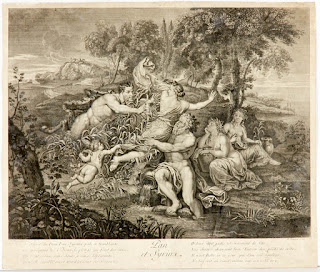Greek Text
"Only at evening, as he returns from the chase, he sounds his note, playing sweet and low on his pipes of reed: not even she could excel him in melody —that bird who in flower-laden spring pouring forth her lament utters honey-voiced song amid the leaves. At that hour the clear-voiced nymphs are with him and move with nimble feet, singing by some spring of dark water, while Echo wails about the mountain-top, and the god on this side or on that of the choirs, or at times sidling into the midst, plies it nimbly with his feet. On his back he wears a spotted lynx-pelt, and he delights in high-pitched songs in a soft meadow where crocuses and sweet-smelling hyacinths bloom at random in the grass...
Then all the immortals were glad in heart and Bacchic Dionysus in especial; and they called the boy Pan1 because he delighted all their hearts.And so hail to you, lord! I seek your favour with a song. And now I will remember you and another song also"
1 The name Pan is here derived from πάντες“ all.” Cp. Hesiod, Works and Days 80-82, Hymn to Aphrodite (v) 198, for the significance of personal names.
Πᾶνα δέ μιν καλέεσκον, ὅτι φρένα πᾶσιν ἔτερψε.
καὶ σὺ μὲν οὕτω χαῖρε, ἄναξ, ἵλαμαι δέ σ᾽ ἀοιδῇ
αὐτὰρ ἐγὼ καὶ σεῖο καὶ ἄλλης μνήσομ᾽ ἀοιδῆς.
Pan and and the nymph Syrinx:












No comments:
Post a Comment